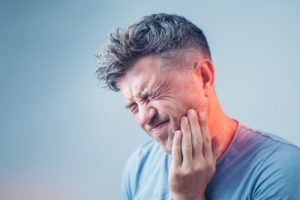
The holidays are often lauded as a time of joy and cheer, but the carols never seem to mention how stressful the holiday season can be. Making sure all the gifts are sent out and worrying how you’re going to pay for them can really take a toll on your mental health. Not only that, but the stress can manifest in physical ways as well. In terms of your oral health, stress can cause a harmful condition known as bruxism. Let’s talk more about what bruxism is, and how you can put a stop to it.
What Is Bruxism?
Bruxism is a condition where you (usually unconsciously) grind or clench your teeth together. It most often occurs while you’re sleeping so you’re unable to notice when you’re doing it. This is a common condition that affects 30-40 million American children and adults. It’s currently believed that the most common cause of bruxism is stress or anxiety.
If you experience any of the following symptoms, you might have bruxism:
- Tight or painful jaw muscles
- Your partner hearing a grinding sound at night
- Rhythmic contractions of the jaw muscles
- Long-lasting face or jaw pain
- Swelling on the side of your lower jaw
- Damaged teeth, broken fillings, or injured gums
- Dull morning headaches
If you suspect you might have bruxism, the first thing you should do is call your dentist, as they are experts in the area of treating the disorder.
How Your Dentist Can Treat Bruxism
More often that not, the effects of bruxism can be counteracted by fitting you with a nightguard – a tray worn over the teeth while you sleep to prevent harmful contact and accelerated wear and tear on your teeth. It’s made of comfortable plastic, so it should not interfere with your ability to get quality sleep. In many cases, a nightguard might gently push your jaw into a more aligned position so it doesn’t feel the need to grind or clench.
How to Reduce Holiday Stress
If your bruxism is stress-related, your dentist may suggest seeing a therapist to help you talk through your issues. Remember that there is absolutely nothing wrong with seeing a mental health professional, especially when it can help your physical health as well. Practice other relaxing methods as well, such as journaling before bed, taking a relaxing bath, or simply talking to a friend or loved one about what stresses you.
The holidays can be an anxiety-inducing time for everyone, and can exacerbate oral health issues like teeth grinding. When in doubt, talk to your dentist about your bruxism, and they will help as best they can.
About the Author
Dr. Dhiren Ahir earned a dental degree in India before relocating to the United States and graduating from the prestigious New York University College of Dentistry, eventually settling at Prime Dentistry in Denton, TX a few years later. He stays active in the dental community as a member of the American Dental Association, the Texas Dental Association, and the Dallas County Dental Society. If your holiday stress is taking a toll on your pearly whites, contact Dr. Ahir by clicking here.






